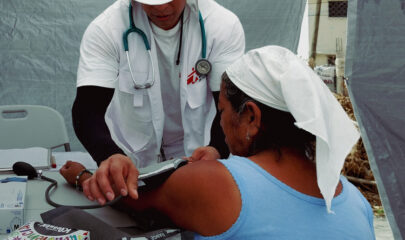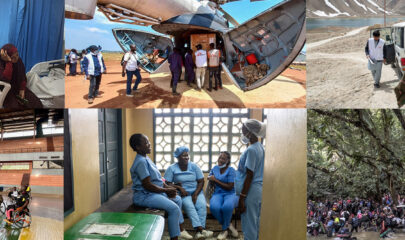Twenty years ago, Mulikat Okanlawon travelled to a specialist hospital in northwest Nigeria to be treated for a devastating disease. Now, she works to inspire young patients and adds her voice to Doctors Without Borders/Médecins Sans Frontières (MSF) advocacy for survivors of the condition.
Okanlawon is a survivor of noma, an infection that affects mainly children and can leave survivors with severe facial disfigurements and life-threatening impairments.
She came from Lagos to Sokoto in northwest Nigeria to seek medical care. Today, she works as a hygiene officer at the MSF-supported Noma Children’s Hospital in Sokoto and speaks out on behalf of other people affected by this devastating and neglected disease.
“As long as there is life, there is hope, and with hope, there is nothing you cannot do.”
But there is a way out: surgery brings a chance to heal.
For a survivor of noma, coming to the Sokoto hospital is life-changing. Before I started my treatment, I had lost hope, but after the operations, I began to understand that I am still a human being like others.
CHANGE AND MOTIVATION
The person who helped me realize it was Dr. Adeniyi Adetunji, who works at the Sokoto hospital. He has changed everything for me. He motivated me go back to school.
At that point, I did not even want to try it, because of the stigma, because of how people looked at me whenever I came near them. But Dr. Adetunji encouraged me. He told me I should see myself as a changed person. He wanted me to go to the community and to give back.
So, I went and found motivation and courage.
LIVED EXPERIENCE
At school, I studied health record management. Then, in 2018, MSF offered me a job. If it hadn’t been for that offer,
I don’t know where I would be as I had nowhere to go.
Today, I am a hygiene officer, working with cleaners and patients in the hospital. I make sure the environment is clean and I talk to patients and caregivers about personal hygiene.
I also help our mental health team to support noma survivors, who are just like me in the past. I share with them my experience. I tell them they should be very strong and things will get better. They know I was in their situation before, some of them have even seen my picture taken before the surgeries. But look at me now!
As long as there is life, there is hope, and with hope, there is nothing you cannot do. My MSF colleagues are easy to work with and they see me as they see themselves. There is no stigma. I am very happy they have accepted me in the organization, it’s a great joy for me.
“It’s a long journey, but when patients go back to the community after surgeries, they go back different.”
We also have another colleague in the hospital, working for the Ministry of Health, who is a survivor of noma, Dahiru. He works as a cleaner.
Doctors in Sokoto hospital should continue to empower patients and encourage them to return to school, so they can become advocates.
It’s a long journey, but when patients go back to the community after surgeries, they go back different.
When you look at me, you can see I have been through something difficult in life. But I don’t think about my past anymore. My goal is to inspire people.
I want to share my story, so everyone knows noma is real and that there is ability in disability.
CONSEQUENCES OF NOMA



